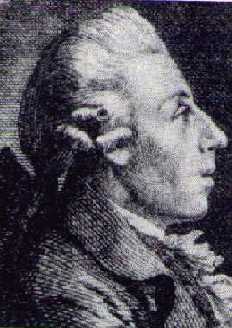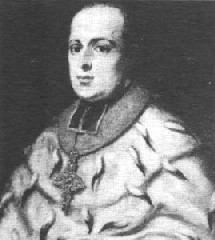 Christian Gottlob Neefe |
*As the American historian Alexander Wheelock Thayer explains in his book, The Life of Beethoven, this musician came to Bonn to join the theater company as its musical director in 1779. Born 1748 in Chemnitz, Saxony, this graduated jurist turned away from law and studied music in a process of self-study of the theoretical works of C.P.E. Bach and of Marpurg, but he also received support from Johann Adam Hiller, Director of the Gewandhaus concerts in Leipzig, who also gave him his position in Dresden as musical director of Seyler's company in 1777. Although Neefe composed several operettas, he considered himself not as fully trained in counterpoint. Once in Bonn, he was also actively involved in Masonic activities as local head of the Bavaria-based Illuminati and, after its voluntary dissolution in 1784, in the newly formed, tamer Reading Society.
Already during the Elector's usual retreat to Münster in the summer months of 1782, for which Neefe had to accompany him, he trusted his young apprentice to take over his duties as court organist. According to Thayer, his duty was "no sinecure".
Not only did Neefe trust Beethoven to perform admirably as his replacement, he also recognized his student's genius. Since he frequently wrote articles for musical publications, it should not come as a surprise to find his following March 2nd, 1783, article which he submitted to Cramers Magazin der Musik:
"Louis van Beethoven, son of the above-noted tenor singer, a boy of 11 years, and of most promising talent. He plays the piano very skillfully, and with power, reads at sight very well, and--to put it in a nutshell: he mainly plays the well-tempered clavier by Sebastian Bach which Mr. Neefe has put into his hands. Whoever knows this collection of preludes and fugues in all the keys (which one could almost call the non plus ultra of our art), will know what that means. As far as his other duties allowed him, Mr. Neefe also provided him with instruction in thoroughbass. Now he is training him in composition, and for his encouragement he had 9 variations for the pianoforte written by him on a march (by Dressler) engraved in Mannheim. The young genius deserves to be supported so that he could travel. He would surely become a second Wolfgang Amadeus Mozart, were he to continue as he has begun."
This article describes to us in detail how Neefe trained and furthered his student's talents from the time when Beethoven first began his apprenticeship in late 1781, through 1782 and into the spring of 1783.
With respect to the "9 variations for the pianoforte written by him on a march (by Dressler)", which Beethoven had written in 1782, let us look at what Barry Cooper writes about them:
"It may seem unreasonable to expect anything that is not derivative in the work of an eleven-year-old, yet several signs of truly Beethovenian originality are evident. First is the high level of technique demanded. . . . If this really was Beethoven's first composition, it is an extremely impressive beginning. . . ." (Cooper: 7).
Cooper mentions as the work's weakness a "lack of proper continuity" and that it was based on a funeral march that Beethoven might have composed it as "a fitting memorial" for cousin Franz Rovantini who had died in the fal l of 1781. Perhaps you would like to listen to a midi version of this work?
Beethoven's Nine Variations on a March by Dressler, WoO63 On the strength of the confidence Neefe had in the by now twelve-year old boy, it should not surprise us to learn that Beethoven also took over the duties of a harpsichordist towards the end of the 1782/1783 theater season when Kapellmeister Lucchesi was granted a leave of absence for professional travels and when Neefe had to take over his duties. He turned to his apprentice as his replacement as the rehearsal conductor for the theater company. This gave Beethoven also a chance to increase his already formidable sight-reading skills which would remain with him also in later years. He filled this position from April to June, 1783.
With the end of the theater season and the Elector's departure for Münster in June, 1783, the harpsichordist's duties ended. Once again, Beethoven had time to compose. In addition to some minor efforts such as a song and a rondo for pianoforte, he also composed three piano sonatas which he dedicated to his Elector, Maximilian Friedrich, and which were published by Bossler in Speyer in October, 1783.
With respect to these Sonatas, Cooper writes:
"These are full-sized, three-movement sonatas, and impressive by any standards; for a twelve-year-old they are astonighing. . . . The three sonatas are not without their weaknesses, chief of whic is, once again, insufficient sense of continuity . . . " (Cooper: 10 and 11).
Unfortunately, we are not able to provide you with a listening example of these Sonatas, at this time. As a 'recompense', we can, however, offer you a sample of his 'minor efforts', namely the 'rondo for pianoforte', Wo0 48:
Here, we should discuss the fact that Beethoven's journey to Holland did not, as Thayer had assumed, take place in late 1781, but rather in late 1783. Let us quote from Barry Cooper's 2000 Beethoven biography:
"By the end of 1783, Neefe's desire that Beethoven should travel had been fulfilled, but the journey to Holland was essentially a private one and there is no evidence that it was subsidized by the Elector. The circumstances surrounding the trip are related by Fischer.(14) Franz Rovantini had a sister, Anna Maria Magdalena, who was emplyed by a rich widow as a governess in Rotterdam. When Beethoven's mother informed her of Rovantini's death in 1781, she became anxious to visit his grave in Bonn, and evenually did so in autumn 1783. . . . A return visit by the Beethovens was arranged; Johann was unable to go, and so Beethoven went with his mother. During the journey down the Rhine, the weather was so cold that his mother reportedly held his feet in her lap to prevent frostbite. They stayed in Rotterdam for some time, and Beethoven played in several great houses there, astonishing people with his ability. He also performed on the piano at the Royal Court in The Hague, some ten miles away, on 23 November, and was paid 63 florins--far more than anyone else listed at the event. Nevertheless, he returned dissatisfied with the rewards, describing the Dutch as penny-pinchers and vowing not to go to the Netherlands again" (Cooper: 11; The details of Beethoven's November, 1783, performance at the Royal Court in The Hague, are derived from a payroll document of the Court of Prince Willem V of Orange-Nassau, dated November 26, 1783, which refers to a 'Funded Concert' on November 23, 1783, which lists as first performer the soloist, "Mons. Beethoven, forte-piano, 12 y[ears] 63.--", quoted from "Letters to Beethoven and Other Correspondence", Translated and Edited by Theodore Albrecht, Volume I: 1771-1812, University of Nebraska Press, in association with the American Beethoven Society and the Ira F. Brilliant Center for Beethoven Studies, San Jose, San Jose State University, 1996, page 3).
The 1783/1784 theater season started out hectic in fall, as Neefe was still replacing Lucchesi and delegating many of his duties to his young apprentice. The usual time for such an apprenticeship or probation without pay (it must be mentioned, however, that Beethoven's upkeep was paid by the court since his father could no longer pay for it) was one year, out of which had become two by this time, and Beethoven's skills must have well exceeded what was usually expected of a young musician.
On the strength of his teacher's confidence in his abilities and perhaps, as Cooper argues, also on the strength of his recent travels to Holland, Beethoven petitioned to the court in February, 1784, to he hired on as a court musician.
While he handed in his petition, Bonn experienced a great flood of the river Rhine. More tribulations would follow which would delay the end of Beethoven's apprenticeship: Elector Maximilian Friedrich passed away on April 15th, 1784, and his Minister Belderbusch soon followed him to the grave.
During the course of 1784, the new Elector Maximilian Franz, Empress Maria Theresia of Austria's son, established his residence and reviewed all of his court staff, including his musicians, with a view to saving money.
 Elector Maximilian Franz |
He requested reports on all of them. The Calvinist court organist Neefe seemed expendable. First of all, before the closing of the year, Neefe's annual salary of 400 florins was reduced to 200 florins, and Ludwig van Beethoven, not yet fourteen years old, was hired on as assistant court organist at an annual salary of 150 florins. This situation was reviewed once more in early 1785. Neefe's true merits had been recognized by that time, and his salary was restored. Beethoven's salary was adjusted to 100 florins annually. From then on, the young musician was at last no longer an apprentice without an official salary, but a wage earner and breadwinner for his family and earned half of the salary of the court tenor Johann van Beethoven, namely 200 florins annually. Due to the decline of his father's tenor voice, Ludwig would soon also have to find additional sources of income to assist his family. This will be discussed in the next section.